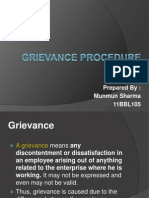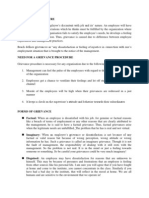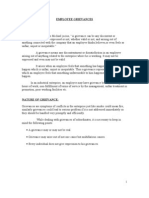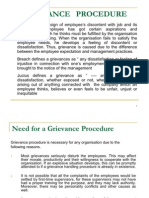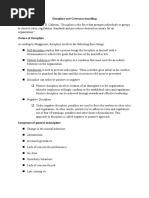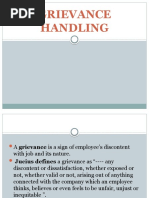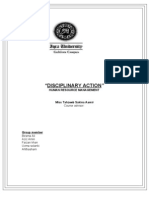0 ratings0% found this document useful (0 votes)
4 viewsGgs
Ggs
Uploaded by
Akuros GamingGrievance refers to any real or perceived dissatisfaction or injustice felt by an employee regarding their job or the organization's policies and procedures. Grievances arise when employee expectations are not met and can result in frustration, low productivity, and absenteeism if left unaddressed. An effective grievance management system is therefore an important part of personnel management. It should involve quickly acknowledging and investigating grievances, identifying their causes, deciding on remedies, executing decisions, and reviewing outcomes to resolve issues and prevent future grievances. This helps create an amicable work environment by addressing employee concerns and improving organizational policies.
Copyright:
© All Rights Reserved
Available Formats
Download as TXT, PDF, TXT or read online from Scribd
Ggs
Ggs
Uploaded by
Akuros Gaming0 ratings0% found this document useful (0 votes)
4 views1 pageGrievance refers to any real or perceived dissatisfaction or injustice felt by an employee regarding their job or the organization's policies and procedures. Grievances arise when employee expectations are not met and can result in frustration, low productivity, and absenteeism if left unaddressed. An effective grievance management system is therefore an important part of personnel management. It should involve quickly acknowledging and investigating grievances, identifying their causes, deciding on remedies, executing decisions, and reviewing outcomes to resolve issues and prevent future grievances. This helps create an amicable work environment by addressing employee concerns and improving organizational policies.
Copyright
© © All Rights Reserved
Available Formats
TXT, PDF, TXT or read online from Scribd
Share this document
Did you find this document useful?
Is this content inappropriate?
Grievance refers to any real or perceived dissatisfaction or injustice felt by an employee regarding their job or the organization's policies and procedures. Grievances arise when employee expectations are not met and can result in frustration, low productivity, and absenteeism if left unaddressed. An effective grievance management system is therefore an important part of personnel management. It should involve quickly acknowledging and investigating grievances, identifying their causes, deciding on remedies, executing decisions, and reviewing outcomes to resolve issues and prevent future grievances. This helps create an amicable work environment by addressing employee concerns and improving organizational policies.
Copyright:
© All Rights Reserved
Available Formats
Download as TXT, PDF, TXT or read online from Scribd
Download as txt, pdf, or txt
0 ratings0% found this document useful (0 votes)
4 views1 pageGgs
Ggs
Uploaded by
Akuros GamingGrievance refers to any real or perceived dissatisfaction or injustice felt by an employee regarding their job or the organization's policies and procedures. Grievances arise when employee expectations are not met and can result in frustration, low productivity, and absenteeism if left unaddressed. An effective grievance management system is therefore an important part of personnel management. It should involve quickly acknowledging and investigating grievances, identifying their causes, deciding on remedies, executing decisions, and reviewing outcomes to resolve issues and prevent future grievances. This helps create an amicable work environment by addressing employee concerns and improving organizational policies.
Copyright:
© All Rights Reserved
Available Formats
Download as TXT, PDF, TXT or read online from Scribd
Download as txt, pdf, or txt
You are on page 1of 1
Grievance System
Grievance may be any geneuine or imaginary feeling of dissatisfaction or injustice
which an employee experiences about his job and its nature, about the management
policies and procedures.
It must be expressed by the employee and brought to the notice of the management
and the organization.
Grienvances take the form of collective disputes when they are not resolved.
Also they will lower the morale and efficiency of the employees.
Unattended Grievances result in frustration, dissatisfaction, low productivity,
lack of interest in work absenteeism, etc.
In short, griecabce arises when employees expectations are not fulfilled from the
organization as a result of which a feeling of discontentment and dissatisfaction
arises, this dissatifaction must crop up from the employment issues and not from
personal issues
Grievance may result: from the following factors
A. Improper working conditions such as strict production standards, unsafe
workplace, bad relation with managers, workplace is far away from home, etc.
B. Irrational management policies such as overtime, transfers, demotions,
inappropriate salary structure, etc.
C. Violation of organizational rules and practices.
D. The manager should immediately identify all grievances and must take appropriate
stes to eliminate the causes of such grievances so that the employees remain loyal
and commited to their work.
Effective grienvance management is essential part of personnel managament.
How to Effectively Manage Grievance
1. Quick action- As soon as the grievance arises, it should be identified and
resolved.Training must be given to the managers to effectively and timely manage a
grievance on the employees and their performance.
2. Acknowledging grievance- The manager must acknowlegde the grievance put forward
by the employee as manifestation of true and real feelings of the employees.
Acknowledgement by the manager implies that the manager is eager to look into the
complaint impartially and without any bias. This will create an environment
conducive to the work with instances of grievance reduced.
3. Gathering facts- The manager should gather appropriate abd sufficient facts
explaining the grievance's nature. A record of such facts must be maintained so
that these can be used in later stage of grievance management.
4. Examining the causes of grievance- The actual cause of grievance should be
indentified. Accordingly remedial actions should be taken to prevent repetition of
the grievance.
5. Making a Desicion- After identifying the causes of grievance, alternative course
of actions should be thought of to manage the grievance. The effect of each course
of action on the existing and future management policies and procedure should be
analyzed and accordingly decision should be taken by the manager.
6. Execution and review- The manager should be execute the decision quickly,
ignoring the fact, that it may or may not hurt employees concerned. After
implementing the decision, a follow-up must be there to ensure that the grievance
has been resolved completly and adequately.
An effective grievance procedure ensure an amiable work environment because it
redresses the grievance to mutual satisfaction of both the employees and the
managers. It also helps the management to frame policies and procedured acceptable
to the employees. It becames an effective medium for the emloyees to express the
feelings, discontent and dissatisfaction openly and formally.
You might also like
- Administrative Procedures and ManagementFrom EverandAdministrative Procedures and ManagementRating: 5 out of 5 stars5/5 (1)
- Disciplinary Procedures: Following Are Some of The Purposes and Objectives of Disciplinary ActionDocument7 pagesDisciplinary Procedures: Following Are Some of The Purposes and Objectives of Disciplinary ActionManjushree.vNo ratings yet
- Grievance ProcedureDocument11 pagesGrievance ProcedureApeksha TiwariNo ratings yet
- BIR RULING NO. 1102-18: Tata Consultancy Services (Philippines), IncDocument3 pagesBIR RULING NO. 1102-18: Tata Consultancy Services (Philippines), IncKathleen Leynes100% (1)
- External Factors Weight Rating Weighted Score Comment OpportunitiesDocument3 pagesExternal Factors Weight Rating Weighted Score Comment OpportunitiesRona Mae RosauroNo ratings yet
- Handling A GrievanceDocument3 pagesHandling A GrievanceParvathy R NairNo ratings yet
- Chapter 10Document7 pagesChapter 10Pardeep GuptaNo ratings yet
- GrievanceDocument15 pagesGrievanceJasmandeep brar100% (3)
- Grievance and Discipline PDFDocument20 pagesGrievance and Discipline PDFNagesh100% (1)
- Topic Importance - Grievance HandlingDocument9 pagesTopic Importance - Grievance HandlingA DASHNo ratings yet
- Grievance: in An Employee Arising Out of Anything Related To The Enterprise Where He Is WorkingDocument20 pagesGrievance: in An Employee Arising Out of Anything Related To The Enterprise Where He Is Workingmunisha41No ratings yet
- A Study On Grievances HandlingDocument19 pagesA Study On Grievances HandlinglooserNo ratings yet
- Grievance: Christina Jose MahrmDocument19 pagesGrievance: Christina Jose MahrmChrz JNo ratings yet
- Grievance Redressal ProcedureDocument5 pagesGrievance Redressal ProcedureYogesh YogiNo ratings yet
- Employee Relation ManagementDocument12 pagesEmployee Relation ManagementMLANISA P.No ratings yet
- Grievance ProcedureDocument12 pagesGrievance Procedureshubh bhansali100% (1)
- Concept of Grievance: Grievance Is A Sign of An Employee's Discontent With Job and Its ValueDocument40 pagesConcept of Grievance: Grievance Is A Sign of An Employee's Discontent With Job and Its Valuejyoti_dhomaneNo ratings yet
- Employee GrievancesDocument37 pagesEmployee Grievancesravikiran1231No ratings yet
- PA 215 - ReportDocument6 pagesPA 215 - Reportarniel somilNo ratings yet
- Human RelationsDocument29 pagesHuman RelationsVaibhav KannavNo ratings yet
- Chapter 8 - Employee Grievances & DisciplinesDocument6 pagesChapter 8 - Employee Grievances & DisciplinesJohn SenaNo ratings yet
- Grievance ProcedureDocument21 pagesGrievance ProcedurePriyanka_Bagdi_1938No ratings yet
- Code of Discipline - Industrial PeaceDocument6 pagesCode of Discipline - Industrial Peacethilaga2009100% (1)
- Grievance ProcedureDocument21 pagesGrievance ProcedureMuthu KumaranNo ratings yet
- Grievance Handling - HRMDocument13 pagesGrievance Handling - HRMPooja mehra100% (1)
- Concept of Employee GrievancesDocument71 pagesConcept of Employee Grievancesfatimamehnaz100% (1)
- Grievance ProcedureDocument21 pagesGrievance Procedurevijaypalsingh96% (27)
- Employee Relations and DisciplineDocument16 pagesEmployee Relations and DisciplineNyna Claire Gange100% (4)
- Presentation On Employee GrievancesDocument15 pagesPresentation On Employee GrievancesParull SacharNo ratings yet
- Discipline and Grievance HandlingDocument13 pagesDiscipline and Grievance Handlingswati_pthkNo ratings yet
- Discipline 1Document21 pagesDiscipline 1rekha dhankaniNo ratings yet
- Grievance May Be Any Genuine or Imaginary Feeling of Dissatisfaction or Injustice Which AnDocument94 pagesGrievance May Be Any Genuine or Imaginary Feeling of Dissatisfaction or Injustice Which AnchanduNo ratings yet
- Grievance Handling-Industrial RelationsDocument4 pagesGrievance Handling-Industrial RelationsArif Mahmud Mukta100% (5)
- HRM Assignment 3Document3 pagesHRM Assignment 3NakulNo ratings yet
- Grievance Handling Procedure With Reference To Birla CementDocument55 pagesGrievance Handling Procedure With Reference To Birla Cementvaishalipress1978No ratings yet
- Example of A Disciplinary ProcedureDocument3 pagesExample of A Disciplinary ProcedureLAARNI SOTTONo ratings yet
- Grievance HandlingDocument5 pagesGrievance HandlingTrendy TrendsNo ratings yet
- HRM PresentationDocument14 pagesHRM PresentationAmritha ShettyNo ratings yet
- Reporter: Nebrida, Beverly Joy Professor: DR. KAREN ESTIRA: Pangasinan State UniversityDocument6 pagesReporter: Nebrida, Beverly Joy Professor: DR. KAREN ESTIRA: Pangasinan State UniversityVinluan SourNo ratings yet
- Deceplinary Action ProcedureslDocument12 pagesDeceplinary Action ProcedureslsasifkazmiNo ratings yet
- IndisciplineDocument12 pagesIndisciplineKrishna Chandran PallippuramNo ratings yet
- KATH Presentation.Document23 pagesKATH Presentation.Shiellanie Diaz CajesNo ratings yet
- Employee DisciplineDocument10 pagesEmployee DisciplineHassan Tahir SialNo ratings yet
- DisciplineDocument6 pagesDisciplineanushavergheseNo ratings yet
- AssignmentDocument7 pagesAssignmentasib.silkenNo ratings yet
- Policy and Procedures: City AccountantsDocument5 pagesPolicy and Procedures: City AccountantsMD Rakibul Hassan RiponNo ratings yet
- GrievanceDocument16 pagesGrievanceParul SaxenaNo ratings yet
- Managing Hospitality Human Resources - II: Academic Year: 2018-2019Document9 pagesManaging Hospitality Human Resources - II: Academic Year: 2018-2019Tarun DagarNo ratings yet
- Employee GrievanceDocument18 pagesEmployee GrievanceEfaf Ali100% (3)
- What Is GrievanceDocument7 pagesWhat Is GrievancevandylocksuNo ratings yet
- Grievance Means Any Type of Dissatisfaction or DiscontentmentDocument3 pagesGrievance Means Any Type of Dissatisfaction or DiscontentmentJitendra DasNo ratings yet
- Grievance Handling Unit 4Document13 pagesGrievance Handling Unit 4hindi anime story0% (1)
- Labour Relations Final)Document27 pagesLabour Relations Final)farooqbhNo ratings yet
- Unit 10 Employee Grievance and Discipline: StructureDocument11 pagesUnit 10 Employee Grievance and Discipline: StructureGiriraj GodaniNo ratings yet
- Dealing with Dismissal: Practical advice for employers and employeesFrom EverandDealing with Dismissal: Practical advice for employers and employeesNo ratings yet
- Basic Principles and Practice of Business AdministrationFrom EverandBasic Principles and Practice of Business AdministrationNo ratings yet
- The Front-line Manager: Practical Advice for SuccessFrom EverandThe Front-line Manager: Practical Advice for SuccessRating: 5 out of 5 stars5/5 (1)
- Human Resources Management: A Guide on How to Implement HR Best Practices Includes Ready Structured Procedures and FormsFrom EverandHuman Resources Management: A Guide on How to Implement HR Best Practices Includes Ready Structured Procedures and FormsNo ratings yet
- Financial Management CIADocument7 pagesFinancial Management CIAvarshitha kotapatiNo ratings yet
- 2002 Coca ColaDocument118 pages2002 Coca Colajinuthomas83No ratings yet
- 1270A544-032 Console v3.1Document304 pages1270A544-032 Console v3.1badr eddine100% (1)
- Business LawDocument23 pagesBusiness LawSimran SinhaNo ratings yet
- Fs 2013 2Document41 pagesFs 2013 2Surbhi MehtaNo ratings yet
- Ciffa Exam 104-123Document20 pagesCiffa Exam 104-123MassimoNo ratings yet
- ch04 PDFDocument43 pagesch04 PDFdanielaNo ratings yet
- Food QualityDocument2 pagesFood QualityKida GoombaNo ratings yet
- Ankit Soni: Education Personal InfoDocument1 pageAnkit Soni: Education Personal InfoMd Asif AlamNo ratings yet
- Sven Maldonado - Resume PDFDocument2 pagesSven Maldonado - Resume PDFSven MaldonadoNo ratings yet
- Paper IEIDocument6 pagesPaper IEIAssefa MogesNo ratings yet
- Google Pillar One Pager - 2021Document1 pageGoogle Pillar One Pager - 2021Mikhail KyznetsovNo ratings yet
- AP. Cash and Cash EquivalentsDocument3 pagesAP. Cash and Cash EquivalentsGia Sarah Barillo BandolaNo ratings yet
- International FINANCIALDocument32 pagesInternational FINANCIALVinodh Kumar LNo ratings yet
- Monitoring Is A Periodically Recurring Task Already Beginning in The Planning Stage of A Project or ProgramDocument31 pagesMonitoring Is A Periodically Recurring Task Already Beginning in The Planning Stage of A Project or ProgramBura ManNo ratings yet
- Manacc 3-Manacc NotesDocument16 pagesManacc 3-Manacc NotesUzair IsmailNo ratings yet
- Report On Planning and Organizing of Pathao.Document13 pagesReport On Planning and Organizing of Pathao.Arafat Khan50% (2)
- SQE Class Task-1Document3 pagesSQE Class Task-1ubaida waheedNo ratings yet
- Female Candidates Are Strongly Encouraged To ApplyDocument2 pagesFemale Candidates Are Strongly Encouraged To ApplyDDNo ratings yet
- ABC COMPANY financial statementDocument2 pagesABC COMPANY financial statementmikejerichoparan2005No ratings yet
- ISO Basic Awareness ProgramDocument30 pagesISO Basic Awareness ProgramBalusamyNo ratings yet
- Various Assigned CasesDocument37 pagesVarious Assigned CasesJLNo ratings yet
- Policy On Bank DepositsDocument11 pagesPolicy On Bank DepositsAnshuman SharmaNo ratings yet
- Prin.-of-Marketing-LAS-11 FinalDocument7 pagesPrin.-of-Marketing-LAS-11 FinalMichael Fernandez ArevaloNo ratings yet
- AECOM Property Construction Cost Guide 2017Document79 pagesAECOM Property Construction Cost Guide 2017Abu Muhammad100% (1)
- Topic 11 - Open-Economy Macroeconomics - Basic Concepts.Document36 pagesTopic 11 - Open-Economy Macroeconomics - Basic Concepts.Trung Hai TrieuNo ratings yet
- SAA Versus TAA 2009-01Document5 pagesSAA Versus TAA 2009-01domomwambiNo ratings yet
- BBA - Sales-Management SlidesDocument87 pagesBBA - Sales-Management Slidesazeem rayaduramNo ratings yet


